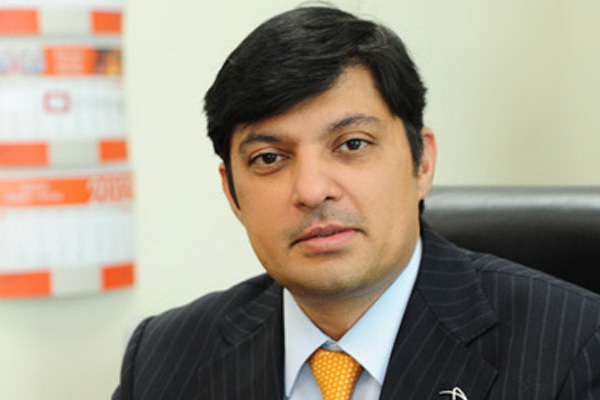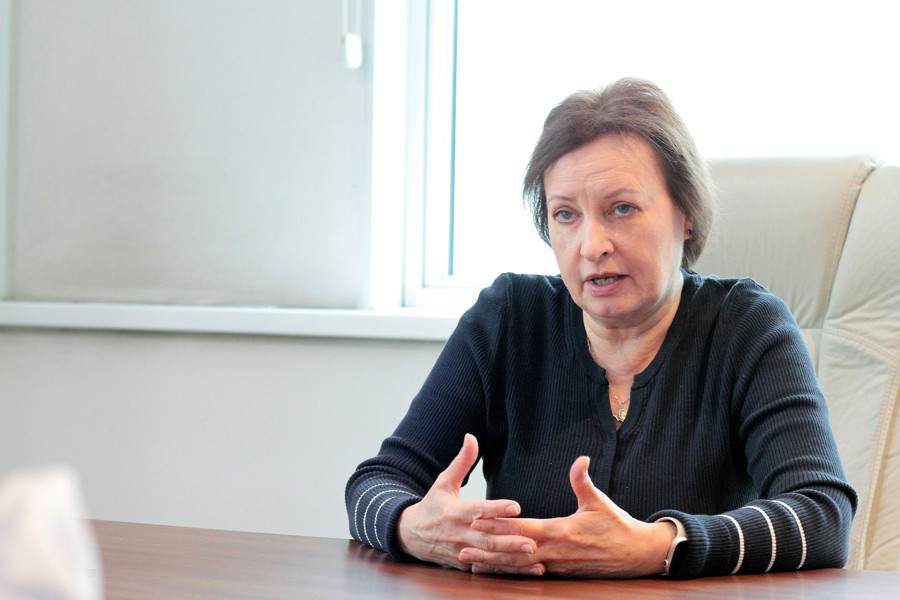Chief Executive Officer of ArcelorMittal Temirtau Vijay MAHADEVAN:
PAY CUT WILL ALLOW US TO SAVE JOBS

The top management of the largest enterprise in Kazakhstan’s mining sector has announced its intention to cut the staff wages and salaries by 25% from August 1 this year. Chief Executive Officer of ArcelorMittal Vijay MAHADEVAN talked in an interview with Interfax-Kazakhstan about what was behind this decision and also voiced his vision of the current situation in the industry.
- The company announced its intention to cut the staff pay by 25%. How are talks with the trade unions ongoing? How did the Government members, whom you met, perceive this proposal?
- This wasn’t a surprise for our trade unions. We have been discussing [this] for about two weeks. This was not anything new for them. Over the past 2 years already various talks have been taking place on a constant basis. Both the staff and trade unions are aware of what kind of situation is taking place, how difficult it is; this issue had been raised repeatedly. The only difference as opposed to all of previous discussions is that this is an official announcement concerning all the staff, which was made yesterday [July 28, 2015].
As for the government this was not a surprise for them either. Of course, we meet various ministries on a monthly basis with the aim of explaining the situation and also for them to be always aware of all developments taking place currently in the industry, business sector and in particular, within our company.
We explain and clarify the situation [to the government] in a such way that this [the pay cut] is not the worst option compared to the option when we would lay off the workers.
We explain this situation saying we are a responsible employer and socially oriented business. Staff cuts would severely undermine households’ standing given that average wages at ArcelorMittal Temirtau currently are higher than average pay in Karaganda region. Again we emphasize that this decision is not the worst one compared to lay-offs.
The government appreciates our frankness towards them and towards our staff. We don’t disguise anything, we are speaking out about the current situation.
As for discussions with trade unions, these were discussions definitely rather than negotiations. We are now trying to clarify the situation and together find the common denominator.
- If the pay cut won’t improve the company’s standing will it mull over lay-offs?
- Now we are hoping to come to terms. First of all, this is linked to the fact that our staff hopefully understand and share our standing, our situation. We are sure that for the time being this will be the [only] measure we resort to. We have faced similar problems since 2009 but they were probably not on such a scale and within different timeframes nevertheless similar situations have already occurred.
Our staff understand well that it is very bad when mines are shut down. This option [pay cut] will allow us to save jobs in mines, in the steel production department and production activity. The iron ore production department had already faced such a difficult situation and the staff really felt in person what is meant to be out of work and not to be fully employed.
The economic situation is very difficult, we border the countries which are already facing certain difficulties; this is both Russia with problems which are already apparent by now and China and the Middle East. All of these countries are experiencing their own difficulties. We as the country bordering these nations, as the company, understand this situation. So, our staff also understand our decision and support us. Hopefully we will reach a certain agreement to this end.
- You pointed out that specifically due to the devaluation of the ruble Russia has a competitive market advantage. What offers may be made in order to equalize this situation?
- The ruble devaluation severely affected the current situation. The devaluation made Russian companies very competitive in the market. This is because the ruble/dollar exchange rate used to be 32-31 rubles for one dollarр, now it is 61 [rubles for 1 dollar], the ruble used to cost 5 tenge, now it costs 3 tenge, all this situation has had a certain effect on Kazakhstan’s manufacturers, all companies suffer from this, not just us. Steps we can take in settling this situation are obviously to control our cost price, strictly supervise expenses while looking forward to the tenge devaluation or to the ruble rising.
- Did you raise your proposals about the forced tenge devaluation with the government? It is known that many businessmen stood up for the tenge devaluation.
- To devalue the tenge or not it is, certainly, within the remit of our government and we are not going to comment on that and we cannot do so. How the state and government could help us - this is, first of all, to cut down transportation costs, transportation and logistics expenses, to provide for additional, let’s say, investments, to facilitate tax regime, as well as, to provide for additional subsidies which may help improve our situation.
On our part, we are making every effort to restrict our expenses wherever possible. The thorough control of expenses is the most sustainable model, which is available across the company. As for oil prices, which also have an effect on the global situation, now oil prices are below 55 [dollars a barrel], this situation puts pressure on the global economy as well.
We can restrict our expenses; the payroll is the main part of our expenses. In addition, we are trying to control the other cost price components implementing various schemes in order to cut down on our cost price in every aspect.
What we could ask our government for is to help us increase demand and boost in particular Kazakh steel consumption in Kazakhstan. We definitely want all homes to be built from Kazakh steel but not from imported steel.
- It turns out that one of the possible ways of getting out of the current situation may be a restriction on steel imports?
- As we are part of the Customs Union we may cut or influence somehow Chinese steel imports only but this must be a common decision. This cannot be Kazakhstan’s decision solely; this must be a decision of all the Customs Union’s participants. This is one of the requests voiced by us but this could be done only in cooperation with Russian manufacturers. Nevertheless our country tries to help us on this matter.
- It was reported earlier that the metal company plans to produce 3.7 million tonnes of steel in 2015. Are these plans still valid in the current circumstances?
- Of course, we will try and fulfill these plans. Provisionally we expect to get 3.6-3.7 million tonnes of steel by the end of the year. But everything will depend on the situation in the market and whether there will be demand for these products. We have every possibility of producing this volume of steel. If we become competitive then we can also produce in order to export our products to the other markets.
Last year though the year was good enough for us in terms of production we were able just to compensate for our expenses. This was, certainly, linked to the fact that there was a lack of cash and thanks to our parent company which supports us, thanks to investments, infusions [it was possible to rectify the situation]. Nevertheless our expenses still prevail over net profit, net cash we earn. We have been continuing with all those investments planned by us yet since 2011-2012, but, unfortunately, that profit we have been earning is insufficient in order to implement all these projects but we continue pursuing all that.
In 2012, 2013, 2014 and partially even in 2015 we made huge investments in the environment [protection], those infusions whereby we pay for emissions, all these emissions, amounted approximately to 200 million dollars. These are huge expenses. That’s why I said that we were forced to apply to our parent company for financial assistance. This may not continue any longer. The company must make money, do business and I am here for this purpose that’s why we offered these measures aimed at cutting down our cost price.
- It was reported as well that ArcelorMittal Temirtau plans to compete a project on upgrading and developing steel production by 2019 which would allow for an increase of 6 million tonnes a year in steel production. Given the current situation haven’t these plans been reviewed?
- We plan to complete the upgrade already by next September. Our project –6 millionth – will be completed next September. We have plans to modernize Furnace no.4; in addition, this year and next year we will repair two sintering machines to produce as much as 5 million tonnes of steel already by 2017 but everything will depend on whether there is the demand for steel in the market.
- Due to the emergency shutdown of Furnace no.2 at ArcelorMittal Temirtau an affiliate of Orken LLP in [the city of] Lisakovsk suspended its activity. How is the situation there?
- Furnace no.2 - we repaired this furnace . By early August already we expect first cast iron from this furnace. There is a quite big warehouse in Lisakovsk now with some stock. As I already said we plan to upgrade a sintering machine very soon; this would be a 60-day production stoppage of this equipment. From October we plan to get back to normal with regard to Lisakovsk-based [enterprise] as it was before.
- Does the metal company plan to expand sales markets?
- Currently we are working in earnest on how to expand sales markets because of the situation in Russia, Iran – an importer of semi-finished metallurgical items – has now started exporting and this has also had a certain effect [on us]. Our idea is to expand into the Black Sea area and to this end we need the support of our government for decreasing, optimizing and assisting with regard to logistics and transportation costs.
- Is there any response from the government to your proposals?
- The government set up a working group to deal with issues, which various companies, not only ours come up with. In particular; this is about an electricity tariff cut and the rest of issues would follow it, this group will work in order to assist and support business. We meet with the government [members] monthly and they have a clear picture of what this company is experiencing.
- Thank you for the interview!
August, 2015
© 2026 Interfax-Kazakhstan news agency
Copying and use of these materials without reference to the source is prohibited
Archive





